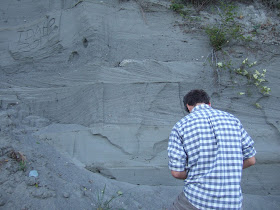I used some digital elevation maps with color changes set to specific elevations to help visualize the Quincy Basin. The Quincy Basin is bound by the Beezley Hills on the north and the Frenchman Hills to the south. The Palouse highlands are to the east. High ground is located to west. This high ground is rather subtle and is immediately bounded to the west by the deep valley/canyon of the Columbia River.
Ice-age floods surged into the Quincy Basin multiple times with much of the water coming out of the Grand Coulee. Some flood waters also came in from the east that spilled out of the floodway south of Spokane and the Telford scabland spillway to the northeast.
DEM of Quincy Basin showing broad alluvial features
This DEM shows how high the water or filled up the basin needed to be in order for the overflow at the northwest corner of the basin to form. (Note typo on map - should be Beezley)
Closer view of the northwest overflow spot as well as the large spill way to the south
With lower water levels (dark green) the northwest water exit would no longer be reached and hence is a much smaller coulee than those to the south.
This DEM shows the two western outflow locations
After each large flood event the plumbing of the basin would have be altered. The early floods into the basin would have backed up water deeper and over a larger area. As lower spillways out the basin were eroded they became wider and deeper and hence the northwest spill over spot would have only received flood waters in the earliest floods. The other spillways would have also started loosing water as the larger spillway to the south through the Drumheller Channels became more established.
The areas of high water flow are rocky ground and include bedrock stripped of soil or boulder strewn gravel bars. The ares of backed up water though left behind thick silt layers. With water from the Columbia Basin Project, the Quincy Basin has been transformed into an expanse of very productive farmland.
















